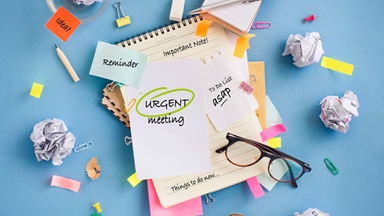Loading component...
At a glance
- Experts say that everyone procrastinates to some degree and for different reasons.
- Awareness of procrastination can vary, depending on the situation.
- There are strategies to minimise the negative impact of procrastination.
By Abigail Murison
“Everyone procrastinates, but not everyone is a procrastinator,” says Professor Joseph Ferrari from DePaul University in Chicago.
From his research, Ferrari estimates about 20 per cent of American adults are chronic procrastinators, delaying action at work, home and in relationships.
People who procrastinate put a disproportionate weighting on the present and not enough emphasis on the future, says Professor Stephen Knowles from the Department of Economics at the University of Otago.
This might also explain why procrastination has been linked to impulsivity, especially difficulty with setting and successfully pursuing short-term and long-term goals.
“I am a terrible procrastinator, by the way, so I can talk about this both first-hand and based on research,” Knowles confesses.
Knowles is what he calls a “sophisticated” procrastinator. Sophisticated procrastinators know they procrastinate and use different strategies to counter this and keep on task.
“A ‘naive’ procrastinator is someone who doesn’t know they do it,” says Knowles. “That’s much harder to deal with.”
Understand why

“People procrastinate for so many reasons, often outside of their own awareness. Sometimes we know we are doing it and it is intentional, other times it is habitual and we are not even conscious of it,” says Dr Marny Lishman, health and community psychologist and author.
Lishman says procrastination is our mind moving us away from activities, tasks and duties that elicit a negative or painful emotion, which could be anger, frustration, stress, fear, boredom, guilt or shame.
We may be avoiding things we do not like, or something about the process itself that we do not like, or the fact that completing a task ultimately will not give us any pleasure.
Georgina Pacor, senior content writer and human resource specialist at the Australian Industry Group, a national employer organisation, says procrastinators are generally not trying to do the wrong thing.
Research suggests that not only do procrastinators intend to do the work, in some cases they may end up doing more work than they intended as a deadline looms.
Rather, procrastinating may be an indicator of anxiety, a fear of failure, or lack of competence in a task.
“In my experience, workplace procrastination cannot be picked by role type but rather by the personality type of the incumbent,” she says.
"Some people believe that procrastinators are lazy or not team players. This can be true, but for many, procrastination comes from a lack of direction or confidence to complete the task up to the required standard."
“Some people believe that procrastinators are lazy or not team players. This can be true, but for many, procrastination comes from a lack of direction or confidence to complete the task up to the required standard.”
However, avoidance of unwanted tasks is not the only reason people procrastinate.
“We can also put off doing things that we enjoy or that are good for us,” says Knowles.
“Life gets in the way. It is not that we do not want to do the task, we just do not want to do it right now.”
Knowles says a good example of this is when people are given restaurant or movie vouchers.
“They have this voucher to use for free for something they really want to do, but a lot of people leave it until the voucher is about to run out. So, they are procrastinating over something they would actually like to do.”
In this instance, procrastination may come down to the timing – it is simply too far away in the future to drive action now.
The pitfalls of distraction

Procrastination can lead to many negative outcomes.
Fail to submit an essay on time and lose marks. Put off completing that report or reviewing a colleague’s work and face the wrath of your manager. Miss the deadline to contribute to a charity fundraiser and feel regret or guilt.
There are also negative societal outcomes for procrastination, says Knowles.
Saving for retirement and staying healthy with regular exercise and a sensible diet both require action now, to reap the rewards later.
“That’s where the effects of procrastination can get really serious,” he says.
In the workplace, procrastination can have implications for both individuals and businesses.
Pacor says that, for employees, workplace procrastination can be associated with low job performance (which may have an impact on salary and rewards), shorter tenure in each position, reduced workplace opportunities for development or progression, increased mental health issues due to stress and emotional exhaustion, and difficulty in finding their next job.
“Employers can experience reduced productivity, output and sales, lower employee performance, slow employee development and agility to learn, missed deadlines, low quality work or an increase in errors, and an increase in low morale and a lack of collaboration.”
Surprise - there are benefits?

However, some experts believe that procrastination may offer some benefits, too.
“There are benefits to everything we humans do – that’s why we have evolved to still be doing them!” Lishman says.
“Procrastination does slow us down for some tasks, which gives us more time to think over some of the things we need to do. It makes us spend time on problem solving.
“Mulling over a task might give us more thinking time to come up with a better way of doing it, and it might be giving you valuable information about what you should be doing more of in your life and what you shouldn’t.”
For others, procrastinating might be beneficial if they thrive under time pressure, adds Knowles.
“Some people work more efficiently if they leave doing a task until the last minute,” he says.
“They might find that if they start the task early, they muck around and struggle to focus. If they leave it to the last minute, they work much more productively.”
How to stay focused
In some ways, if you are a procrastinator, it suggests you are one of the lucky ones who has the option to delay tasks and activities.
“While procrastination is prevalent in all types of positions, industries and levels, it is more common in white-collar positions, as blue-collar roles generally have more regular and specific key performance indicators,” says Pacor.
“There is also a school of thought that people in task-orientated positions or ones that have regular deadlines are less likely to procrastinate than those who operate in long-term projects, innovation or creative positions, where timelines are not as tight.
"When a task becomes challenging, there can be a belief that there is plenty of time, so the task is pushed back.”
What should you do if you are managing someone who is a procrastinator?
“If I’m just interested in making sure they get the job done, I would be trying to set deadlines that are going to keep them on task,” Knowles says.
However, Knowles’s research suggests that deadlines can be a double-edged sword. If you give a procrastinator what you think is a generous deadline to get something done, you may actually have given them an excuse to delay.
"There are benefits to everything we humans do - that’s why we have evolved to still be doing them! Procrastination does slow us down for some tasks, which gives us more time to think over some of the things we need to do. It makes us spend time on problem solving."
“Think carefully about the deadlines that you give people to do something,” he says.
“If I want you to do something for me, I’m best to give you either a fairly short deadline or not mention a deadline at all.”
Managers can also observe when their employees are at their most productive and schedule critical outputs around that.
For example, it might be better to let people get stuck into work in the mornings, when they are fresh and focused, rather than filling up those timeslots with routine team meetings.
“A worker may not procrastinate at all in the morning, but may be a heavy procrastinator in the afternoon, when energy levels decline,” Pacor says.
“It is helpful for leaders to understand the triggers for workers, so that they can maximise work output at the right time of day.”
In addition to these short-term strategies, Knowles suggests a long-term solution – get the employee to recognise that they are a procrastinator and start using some strategies to keep themselves on task.
“That’s particularly important if you’ve observed they are a procrastinator, but they are not someone who works well under pressure,” he says.
“You might need to remind them of a situation when procrastination has caused difficulties for them in the past.”
As many chronic procrastinators will testify, developing strategies to overcome procrastination can be immensely helpful in breaking the cycle and increasing productivity.
However, the best motivator might be a little more self-reflection, says Knowles.
“When we procrastinate, we are not behaving the way our future self would want us to. Maybe what we need to do is ask what our future self would think about it.”
How to improve your focus at work
Tips to fight procrastination

- Acknowledge that you procrastinate. Admitting there is a problem is your first step to addressing it with proper strategies, says Professor Stephen Knowles from the Department of Economics at the University of Otago.
- Ask yourself why you procrastinate. “Are you a time waster at heart, who prefers socialising over success, or is the real issue that you lack confidence or the skill to complete the required task?” asks Georgina Pacor, senior content writer and human resource specialist at the Australian Industry Group. “Be brave enough to open the conversation with your manager, because together you may even discover that the root of the problem is that you actually need more of a challenge!”
- Write a plan, schedule or to-do list. This is important for longer projects and ones without a set deadline, or a deadline that is a long way off.
- Identify your distractions and remove them. Are you lured away from work tasks by conversation, social media or checking your email? It pays to know your weaknesses. You may be able to set up your devices with cut-off times or use distractions as rewards for when you have completed a task.
- Use a time-management technique. The Pomodoro technique, named after the Italian word for tomato is one example. “You decide what you want to accomplish and how long the work will take. Then, break the work into 25-minute ‘pomodoros’ and set a timer. Start working, and enjoy a five-minute break every half hour,” says Pacor.
- Reward yourself. Even the smallest rewards can be enough of an incentive to get past typical procrastination inertia, says Knowles. A reward might be a sweet snack, five minutes of checking social media feeds, or watching a cat video – whatever best motivates you.
- Do not leave the hard parts until last. Instead of putting off the hardest tasks until last minute, tackle them when you are fresh and energised, says Pacor.
- Hold yourself accountable. Let others know that you tend to procrastinate, as well as your plan for overcoming this, so that you are accountable to someone else, suggests Dr Marny Lishman, health and community psychologist and author.

